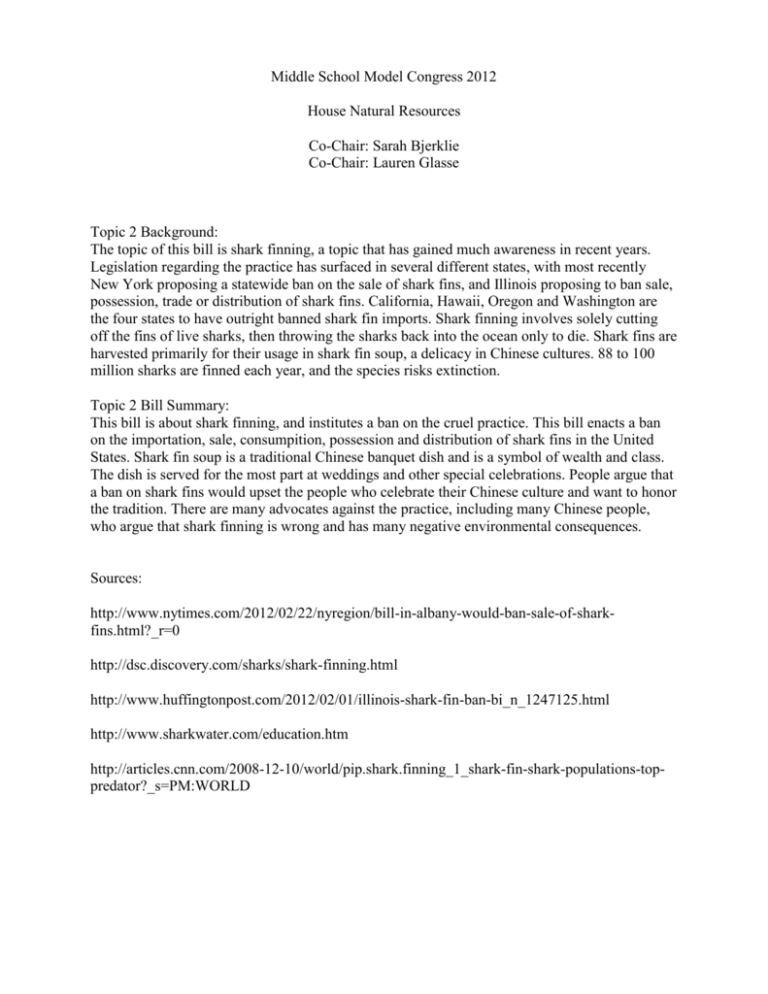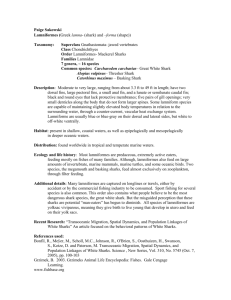6.HouseNatResources
advertisement

Middle School Model Congress 2012 House Natural Resources Co-Chair: Sarah Bjerklie Co-Chair: Lauren Glasse Topic 2 Background: The topic of this bill is shark finning, a topic that has gained much awareness in recent years. Legislation regarding the practice has surfaced in several different states, with most recently New York proposing a statewide ban on the sale of shark fins, and Illinois proposing to ban sale, possession, trade or distribution of shark fins. California, Hawaii, Oregon and Washington are the four states to have outright banned shark fin imports. Shark finning involves solely cutting off the fins of live sharks, then throwing the sharks back into the ocean only to die. Shark fins are harvested primarily for their usage in shark fin soup, a delicacy in Chinese cultures. 88 to 100 million sharks are finned each year, and the species risks extinction. Topic 2 Bill Summary: This bill is about shark finning, and institutes a ban on the cruel practice. This bill enacts a ban on the importation, sale, consumpition, possession and distribution of shark fins in the United States. Shark fin soup is a traditional Chinese banquet dish and is a symbol of wealth and class. The dish is served for the most part at weddings and other special celebrations. People argue that a ban on shark fins would upset the people who celebrate their Chinese culture and want to honor the tradition. There are many advocates against the practice, including many Chinese people, who argue that shark finning is wrong and has many negative environmental consequences. Sources: http://www.nytimes.com/2012/02/22/nyregion/bill-in-albany-would-ban-sale-of-sharkfins.html?_r=0 http://dsc.discovery.com/sharks/shark-finning.html http://www.huffingtonpost.com/2012/02/01/illinois-shark-fin-ban-bi_n_1247125.html http://www.sharkwater.com/education.htm http://articles.cnn.com/2008-12-10/world/pip.shark.finning_1_shark-fin-shark-populations-toppredator?_s=PM:WORLD MIDDLE SCHOOL MODEL CONGRESS Department: House Natural Resources Principal Authors: Sarah Bjerklie Bill No: HNR-10-22-12 Co-Authors: Lauren Glasse Title of Bill: An Act to Prevent Shark Extinction BE IT ENACTED BY THE MIDDLE SCHOOL MODEL CONGRESS ASSEMBLED 1 2 3 4 5 6 7 8 9 10 11 12 13 14 15 16 17 18 19 20 21 22 23 24 25 26 27 28 29 30 31 32 33 PREAMBLE: Whereas the atrocity of sharkfinning occurs primarily in order to make shark fin soup. Whereas shark fin soup is a Chinese delicacy. In order to make the soup, millions of sharks are finned. Around 88 million-100 million sharks die by means of finning each year. Whereas the cruel practice of shark finning involves only cutting off the fins of sharks. Many sharks are still alive after being finned, and are thrown back into the ocean afterwards only to bleed to death and die. Whereas shark fins are not very flavorful and only add texture to the soup. Taking the fins out of shark fin soup would hardly alter the soup. Shark fins are arbitrarily added to the soup for novelty and as a symbol of status. Whereas according to the New York Times, “large glass bottles of desiccated shark fins grace the upper shelves of nearly every convenience store and grocery in Chinatown.” Whereas there is not a huge market for shark fins becayse they are so expensive (around $100 to $500 per pound). Banning shark fins would hardly hurt business economically.Whereas sharks have been around for more than 400 million years. Now, over 100 out of around 400 species of sharks are listed as endangered. Additionally, since sharks are at the top of the food chain and have virtually no predators, they reproduce very slowly. If shark finning persists at the current rate, humans will wipe out sharks entirely in 10-20 years. Whereas contrary to popular belief, shark fins have no medicanal or nutritional value. Whereas sharks are apex predators, which means that they play an essential role in keeping the food chain balanced. If sharks were to die out, it would cause a major imbalance in the food chain, causing population surges in some species of fish and mammals, which would therefore result in huge declines in the populations of these fishes’ prey. Whereas the practice of shark finning has been banned in some states such as California and New York, but is not federally banned. The purchase, consumption, sale and import of shark fins is also not federally banned. SECTION 1: Shark finning will be banned on all U.S. terriotory. SECTION 2: The import of shark fins to the United States will be banned. SECTION 3: The sale, consumption, possession and distrubution of shark fins will be banned. SECTION 4: This bill will go into effect 90 days after its passage. Water Fluoridation Brief Fact Sheet The American Dental Association calls water fluoridation "unquestionably one of the safest and most beneficial, cost-effective public health measures for preventing, controlling, and in some cases reversing, tooth decay."; The National Cancer Institute states that “water fluoridation is the process of adding fluoride to the water supply so the level reaches approximately 0.7 ppm, or 0.7 milligrams of fluoride per liter of water; this is the optimal level for preventing tooth decay.”; Paul Connett, PhD, FAN Executive Director and co-author of the book, The Case Against Fluoride says, "Since fluoride's benefits are topical, it makes no sense to swallow fluoride and makes even less sense to put fluoride into drinking water when fluoridated toothpaste is available to everyone."; Many who oppose water fluoridation consider it to be a form of compulsory mass medication. These argue that consent by all water consumers cannot be achieved, nor can water suppliers accurately control the exact levels of fluoride that individuals receive, nor monitor their response; A warning on Proctor & Gamble Crest toothpaste (in which 0.243% of Sodium fluoride is listed as the active ingredient) states “if more than used for brushing is accidentally swallowed, get medical help or contact Poison Control Center right away.” Indicating that ingesting more than a tiny dosage can be dangerous in young children, the toothpaste container also states, “to minimize swallowing use a pea-sized amount in children under 6”; Sulfuryl fluoride is used as a pesticide and fumigant on agricultural crops. In 2010, the United States Environmental Protection Agency proposed to withdraw the use of sulfuryl fluoride on food; The objective of this bill is to ask debaters - is supposed benefit to dental health worth forcing internal health risk on a mass population? Sources http://www.cancer.gov/cancertopics/factsheet/Risk/fluoridated-water http://www.usatoday.com/yourlife/health/medical/2011-01-07-too-much-fluoride_N.htm http://emergency.cdc.gov/agent/sulfurylfluoride/casedef.asp THE CIVICS & GOVERNMENT INSTITUTE Committee: House Natural Resources Principal Authors: Lauren Glasse Resolution No: 001 Co-Authors: Sarah Bjerklie Title of Bill: An Act to Ban the Adding of Fluoride to Municipal Drinking Water BE IT ENACTED BY THE CIVICS & GOVERNMENT INSTITUTE OF CONGRESS ASSEMBLED 1 2 3 4 5 6 7 8 9 10 11 12 13 14 15 16 17 18 19 20 21 22 23 24 25 26 27 28 29 30 31 32 PREAMBLE: Whereas former United States Environmental Protection Agency scientist Robert Carton claimed that "fluoridation is the greatest case of scientific fraud of this century."; Whereas 41% of adolescents ages 12-15 have dental fluorosis, or discolored teeth, an outwardly visible sign of fluoride toxicity; Whereas Fluoridation chemicals, often purchased from Mexico, China, and Japan are hazardous waste by-products of the phosphate fertilizer industry that are contaminated with trace levels of arsenic, lead and radionuclides. These industrial-grade chemicals were never tested for safety in humans or animals, and never received approval from the U.S. Food and Drug Administration; Whereas New Jersey legislation to fluoridate public water was introduced without notifying or requesting comments from those opposing fluoridation. More than 4,000 professionals (including 331 dentists and 518 MD's) urge that fluoridation be stopped citing scientific evidence that ingesting fluoride is ineffective at reducing tooth decay and has serious health risks The bill which was due for an official vote by either or both full Senate and Assembly on March 15th was postponed until "the earliest mid-May" according to NJ Legislative Services; Be it hereby enacted by the Middle School Model Congress: Section 1: That fluoridation of public water be banned. Section 2: That current legislation regarding the fluoridation of water be declared void. Section 3: That extensive research is done on fluoride’s effects on internal health, oral health and the environment. Section 4: That the US Federal Government allocate money and resources to the removal of existing fluoride in public water. Section 5: This bill will take effect 90 days after its passage.






